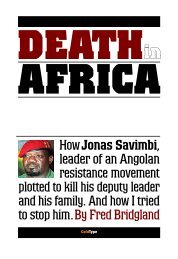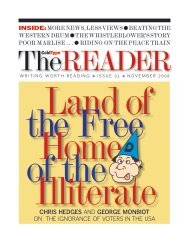UPDATED - ColdType
UPDATED - ColdType
UPDATED - ColdType
- TAGS
- updated
- coldtype
- coldtype.net
Create successful ePaper yourself
Turn your PDF publications into a flip-book with our unique Google optimized e-Paper software.
weapons of mass destruction.<br />
The term “deception” that critics use to challenge<br />
the coverage is now being liberally applied<br />
to characterize the political leaders who started<br />
the war. Clare Short, a former member of the<br />
British Cabinet admitted to Parliament that<br />
there had been willful inconsistencies, mistruths,<br />
and embellishments in the pro-war<br />
speeches and dossiers offered by Prime Minister<br />
Tony Blair. She called it “honorable deception.”<br />
And so, at last, the “d-word,” the idea of deliberate<br />
deception enters mainstream discourse.<br />
This leads to another question, of course. If officials<br />
– including heads of state – whether ‘honorably’<br />
or not, were deceptive, why didn’t the<br />
media catch them in the act, or even try to verify<br />
or debunk their claims. Why were all the halftruths<br />
and the self-serving spin that they came<br />
WHAT CAN WE DO ABOUT IT?<br />
NEW YORK, JULY 1, 2003<br />
AFTER THE WAR: THE<br />
SUMMER OF SUMMING UP<br />
Soldiers die, questions go unanswered<br />
he war is over but the Iraq debate goes on as summer erupts in the West and heat rises to<br />
insufferable degrees in the deserts of Arabia. By early July 2003, the Iraq story had become<br />
an unending catalogue of deadly incidents claiming the lives of British and U.S. soldiers. There<br />
were also daily reports of seething unrest and festering anger by a visibly unpurified and often<br />
enraged Iraqi population. It seems clear that if “we” won the war, we may have already lost<br />
the peace, if there ever was any. Alongside, the reality of the post-war war has been a non-stop parade<br />
of allegations, debates and political recriminations over the status of the still unsuccessful hunt for<br />
243<br />
wrapped in reported with little scrutiny?<br />
The truth is that most media organizations<br />
refused even to make the effort. After the war,<br />
Michael Getler, the Washington Post omsbudsman<br />
asked some questions that should have<br />
been shouted before the conflict got underway:<br />
“The question for news organizations is whether<br />
these claims should have been reportorially<br />
tested and challenged sufficiently. Were news<br />
organizations inhibited for fear of seeming unpatriotic<br />
after September llth?”<br />
THE PATRIOTISM POLICE<br />
THERE is no question that there was pressure on<br />
the media to stay in line. Eric Sorenson who ran<br />
the coverage at MSNBC told The New York<br />
Times, “Any misstep . . . and you can have the

















